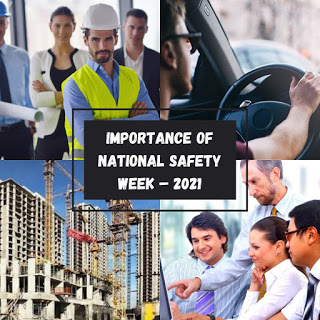National Safety Council was set up on 4th – 11th March 1966 by the Ministry of Labour, Government of India. It carries out various activities such as consultancy on safety issues, safety audits, safety training, and publication of safety-related material such as annual diary, calendar, posters, badges, booklets, films etc.
National Safety Week is celebrated every year from 4th March to 11th March in order to commemorate its foundation day. Many organizations and institutions across the country celebrate this event. The theme of this year is “Enhance Safety and Health Performance by Use of Advanced technologies”.
It is observed to highlight the importance of Safety in all spheres of life so as to prevent mishaps and accidents resulting out of neglect or lack of awareness. Oxford dictionary defines safety as “the state of being safe and protected from danger or harm”.Dr Datar at Ziqitza Limited says safety issues touch all expects of our life. Violation of safety rules either due to ignorance or a bad attitude can result in injury which may result in death, disabilities, and adverse financial impact. It may also result in damage to property causing severe financial loss. For enterprises, it can also result in adverse publicity and damage to brand image. Let us take a look at some safety-related issues.
Road Safety: Though India has less than 3% of the world’s vehicles, it accounts for about 12% of the world’s road deaths. Safe vehicles, safe drivers, safe roads, strict implementation of road safety laws, and road safety awareness among the general public are the key components of reducing accidents. Emergency medical services for road accident victims go a long way in saving lives and minimizing disabilities. Road safety has significant importance for Ziqitza since thousands of our ambulances are on roads thus exposing the ambulance crew as well as patient/relatives to the risk of road accidents.
Workplace Safety: Employees are exposed to many hazards at the workplace including the office due to exposure to physical, chemical, biological, mechanical, psychosocial and ergonomic hazards. At the workplace, in addition to accidents, health issues due to exposure to hazards over a long time are also important. Design of safe workplace, safe machinery and equipment, safe work process, safe material handling, continuous risk analysis, workplace monitoring, compliance to statutory provisions, training and awareness and use of personal protective equipment (e.g. helmets, safety shoes, safety goggles etc.) are key components of preventing workplace injury and adverse health effects. At Ziqitza Healthcare Ltd (ZHL) we know the need of safety at the workplace; therefore we offer multiple corporate wellness solutions catering to the needs of employees.
Electrical Safety: It is said that “Electricity is a good servant but a bad master”. Electric current can cause death, heart arrhythmias and burns. Since there is no area of our life where we do not use electrical equipment, electrical safety is of paramount significance. Use of standard certified equipment, regular inspection and maintenance, compliance to provisions of Central Electricity Authority Regulations in India, training and awareness are key components for safe use of electricity.
Home Safety: We feel very secure and safe at our home. However, if care is not taken, injuries will result. Some of the hazards associated at home are the use of cooking gas, electrical equipment, pressure cooker, wet floor, chemicals used for cleaning and disinfection. Safety of the building we stay in is also important in terms of safe construction, regular repairs and maintenance, fire control systems, lifts and emergency exits. ZHL Rajasthan enables first responders to tackle emergency situations if happen at home through their First Responder Program.
General awareness of safety and the mindset required to follow safety norms is mostly lacking in our country. Not wearing a helmet while riding a two-wheeler and not turning off the knob of the LPG cylinder when not in use are two glaring examples. Many such unsafe practices can be quoted. Risk analysis of any activity and taking appropriate preventive and mitigating measures are key to stay safe and prevent injuries.


